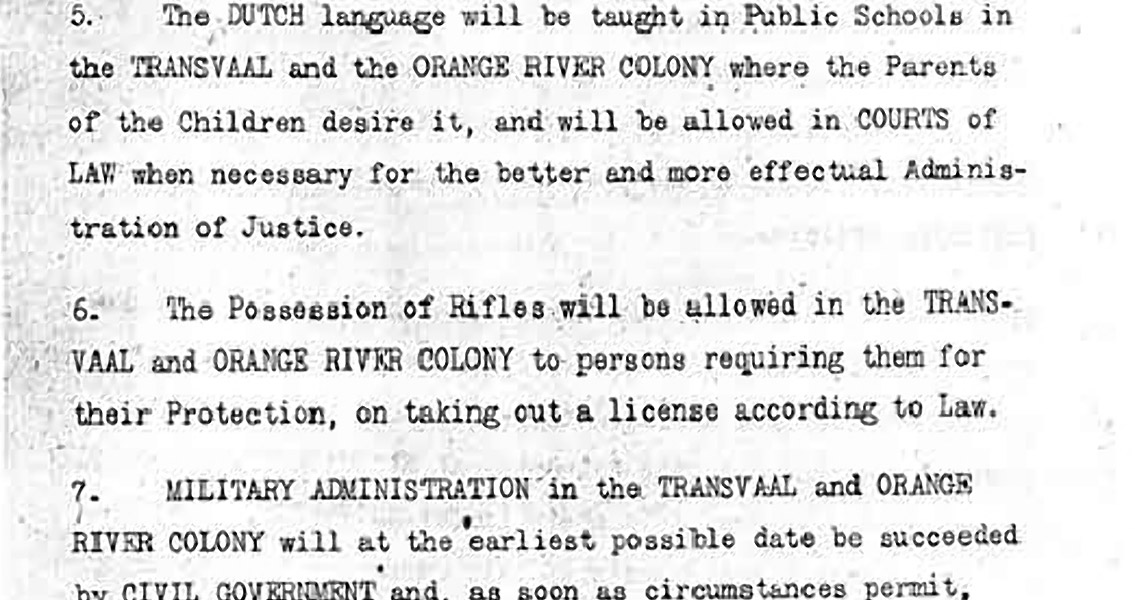<![CDATA[The Second Boer War officially came to an end on 31st May 1902, when representatives of Britain, and the Afrikaner republics of Transvaal and the Orange Free State signed the Peace of Vereeniging in Pretoria. As well as ending the fighting of the Second Boer War, the impact of the treaty was felt for decades. War had erupted two and a half years earlier in circumstances that are still heavily debated by historians. In many ways, the origins can be traced back to Britain's acquisition of the Dutch Cape Colony in 1806 during the Napoleonic Wars. Resentment at growing Anglicisation of the Cape Colony saw many Afrikaners, the descendants of the original Dutch colonists, migrate away and establish their own republics, the Orange Free State and Transvaal, in African tribal territory. The two newly established republics quickly became an obstacle to British desires for imperial expansion in the region, fiercely defiant of British attempts to unify the region under its rule. Already inflammatory, the issue became much more serious following the discovery of substantial gold deposits on the Witwatersand, a region in Transvaal. At a time when countries' financial systems, particularly Britain's, were becoming increasingly reliant on gold, the mining complex established at Witwatersand was the biggest in the world, and thus immensely valuable to whoever owned it. The Transvaal grew increasingly wealthy off the back of the mining complex, allowing the republic to develop, modify and become a challenge to British dominance in South Africa. Britain looked like it could lose control of one of its prized colonial assets at a time it was competing desperately with France and Germany for imperial dominance. In 1897, the British High Commissioner in South Africa, Alfred Milner, demanded modifications to the constitution of the Transvaal which would afford more political rights to the mostly British Uitlanders living in the republic. It was a thinly veiled attempt to upset the political situation, giving the Uitlanders a crucial say in the formulation of state policy and thus likely leading to the republic becoming pro-British. Several attempts were made by the Transvaal Republic to win concessions from Milner, but they repeatedly failed and the British government soon started sending troops to fortify its garrisons in South Africa. On 9th October 1899, the two Boer republics issued an ultimatum to Britain demanding the withdrawal of British troops from the border. No reply was received, and on the 11th October 1899, war was officially declared. In terms of numerical and technological advances, the war should have been an easy victory for the British forces, which had mustered some 500,000 troops compared to the 88,000 from the two Boer republics. However, setting a pattern repeated often throughout the twentieth century, the fact the British military were operating in unfamiliar territory against a defending army, put enormous strain on their forces and turned the war into the country's most costly conflict since the Napoleonic Wars. Shocking brutality soon became a hallmark of British tactics, especially in the last few months of the war as the Afrikaner fighters reverted to guerrilla tactics. The British commander, Lord Kitchener, deployed a vicious scorched earth policy which triggered outrage in the UK and abroad. Entire farms, owned by Boers and native Africans, were burnt and destroyed in an attempt to starve the guerrillas. Men, women and children from rural areas were rounded up and placed in concentration camps, living in terrible conditions blighted by poor hygiene. Many thousands of the camps prisoners would not survive their ordeal. Splits started to appear among the Afrikaners. Soldiers started to surrender, or even defect to the British side in the conflict. The horrendous toll the war was taking increasingly divided the leaders of the Afrikaner republics between those who wanted to fight until the bitter end and those who wished to sue for peace as soon as possible. Eventually, after much debate among their leaders, the Boer forces agreed to negotiate with the British, with representatives of the two Afrikaner republics meeting with Kitchener in Pretoria on 12th April, 1902. On 31st May, terms were finally accepted by both sides. The two Afrikaner republics would accept British sovereignty, but with the promise of eventual self government. Meanwhile, a grant of £3million was provided by the British government to aid in restoring and restocking Boer farms. ]]>
Peace of Vereeniging Ends Second Boer War
